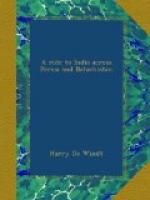Tea and cigarettes discussed, a start was made for the palace. The Wazir, on a wiry, good looking bay horse, and attended by half a dozen mounted Afghans, led the way, and I followed on a pony borrowed of the telegraph clerk. My costume was, if not becoming, at any rate original: high boots, flannel trousers, and shirt, an evening dress-coat, and astrakhan cap. Gerome’s wardrobe being even less presentable, I deemed it prudent to leave him behind. The Beila men brought up the rear of the procession some distance from the Afghans, who, to my anxiety, never ceased scoffing and jeering at them the whole way. Every moment I expected to hear the crack of a pistol-shot, followed by a general melee. Arrived at the Mastung Gate, we dismounted, and, leaving our horses in charge of the guard, slowly proceeded up the steep narrow streets to the citadel.
The entrance to Kelat is not imposing. There had been a good deal of rain, and the streets of the lower part of the town were perfect quagmires of mud nearly knee-deep. It was more like crawling into a dark passage than entering a city. Many of the thoroughfares are entirely covered over with wooden beams plastered with mud, which entirely exclude light, and give them more the appearance of subterranean passages than streets. The upper part of the town is the cleanest, for the simple reason that all filth and sewage runs down open gutters cut in the centre of the steep alleys, until it reaches the level of the plain. There is no provision made for its escape. It is allowed to collect in great pools, which in long-continued wet weather often flood the houses and drive their wretched inhabitants into the open, to live as best they may, further up the hill.
Kelat is, for this reason only, very unhealthy. Small-pox, typhoid, and typhus are never absent, though, curiously enough, cholera visitations are rare. The filthy habits of the inhabitants have, apparently, a good deal to do with the high death rate. I saw, while walking up the hill, a native fill a cup from an open drain and drink it off, although the smell was unbearable, the liquid of a dark-brown colour. A very common and—in the absence of medical treatment—fatal disease among the inhabitants of the suburbs (chiefly Afghans) is stone in the bladder, the water here, though pure and clear in the suburbs, containing a large quantity of lime.
The bazaar, through which we passed on our way to the Mir, does not seem a very busy one. Although not a public or religious holiday, many of the stalls were closed. Kelat was once the great channel for merchandise from Kandahar and Cabul to India, but the caravan trade is now insignificant. There is in the season a considerable traffic in dates, but that is all, for the roads to Persia and Afghanistan are very unsafe. Only a few weeks previous to my visit, a Kelat merchant, proceeding with a large caravan to Kerman, in Persia, was robbed and murdered in the frontier district west of Kharan. Few now attempt the journey, most of the goods being sent to Quetta, and thence by rail to various parts of India, by sea to Persia.




